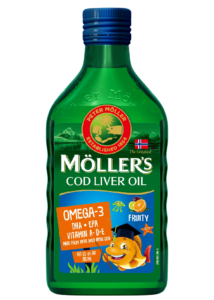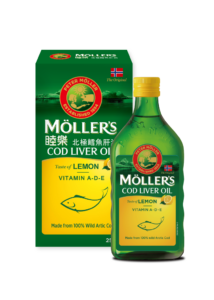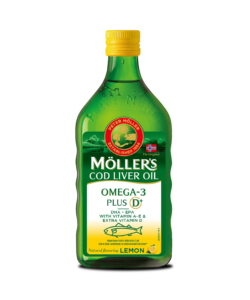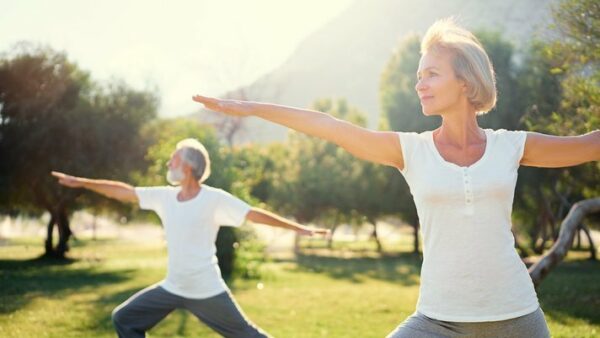Home » 運動是長壽的關鍵
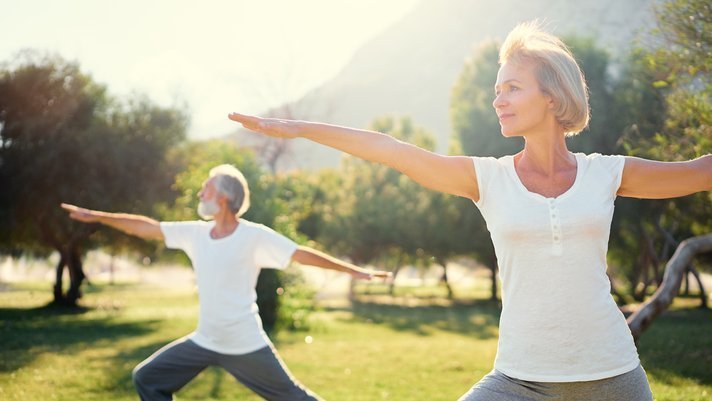
- # omega-3脂肪酸, 健康老化
運動是長壽的關鍵
50歲以後,肌力每十年下降15%。70歲以後,肌力下降得更快:每十年下降30%。但透過運動和保持身體活動,您可以維持肌力並延長壽命。進一步了解爲什麼保持活動是最好的抗老方法,以及您可以做哪些類型的運動。
爲什麼要保持運動和健康?
年紀越大,越需要保持運動來抵抗與年齡有關的肌肉量流失,這種情況女性比男性更常見。您知道力量訓練可以增加晚年的肌肉量,並提高25%至100%的力量嗎?
如果您在晚年仍持續運動,那麼您也能維持更長的獨立性,因爲不會依賴他人幫助您完成購物或上樓梯等日常任務。從長遠來看,這能讓您在家裡住得更久,而這正是我們大多數人所希望的。
65歲以上保持運動的人與不運動的人相比,平均還增加了三年的優質生活。但無論年齡大小,運動和訓練的眾多健康效果都對您的身體有好處。例如,藉由增強肌力,運動可以降低跌倒和骨折的風險。
運動還能提升情緒,降低患生活方式疾病的風險,改善記憶力和其他認知功能。運動還能幫助我們體驗更多,更長時間地保持社交活躍。
積極參加戶外活動,在大自然中或在健身房度過美好時光,可以讓我們結識新朋友。賓果遊戲或保齡球等社交活動能刺激大腦,也是學習新技能的好方法。由於所有身體活動都能讓身體和大腦同時參與,因此運動是保持大腦接收刺激的好方法。
如果您一生都在活動身體,那麼到老年仍繼續保持運動對您來說便不成問題。但是,如果您已經很久沒有做過任何運動,或者您一生中都沒怎麼運動過,那麼您可能很難知道從何開始。如果您是生病狀態或在日常生活中受到其他限制,您可能也會感到很難獲得動力。但好消息是,現在開始還爲時不晚。
找到適合自己的運動類型
英國頂尖的醫師表示,建議成年人每週做兩次肌肉強化訓練以及有氧運動。他們建議每週至少進行150分鐘的中等強度運動,例如快走,或75分鐘的高強度運動,例如跑步。
如果您平衡感較差或行走困難,請每週做三天或更多天的平衡訓練。這將提高身體的穩定性並降低跌倒風險。如果您健康狀況不佳或功能受損,請在健康狀態允許的情況下保持活動。
您可以做無數種類型的運動,唯一的限制是您的想象力。何不從自己喜歡並且往後生活中可持續維持的運動開始呢?散步、滑雪、騎自行車、跳舞或力量訓練都是很好的運動。園藝、砍柴以及其他戶外和室內日常活動也很適合。
需要加強的重要肌肉群包括腿部、臀部、腹部、背部、胸部、肩部和手臂。大多數健身房都會提供個人化訓練計劃的協助,並向您示範如何進行各項訓練。他們還會根據您的身體狀況建議您訓練的頻率。
重點加強腿部和髖關節肌肉及其周圍的肌肉尤其重要。這些肌肉被稱爲「獨立肌肉」,因爲它們能讓您在沒有幫助的情況下坐上或離開椅子。訓練這些肌肉的方法有很多,但其中最佳的是力量訓練。
進行力量訓練不必去健身房。至少在剛開始鍛鍊肌肉的階段,在家做也一樣有效。從徒手訓練開始,即利用自身體重進行的訓練,例如伏地挺身、深蹲和跳躍。一開始時可以不使用額外的器具,之後再增加重量,如水瓶、裝有書的袋子或橡膠阻力帶。
如果您想從最簡單的開始,可以從提購物袋回家、從椅子上站起來時不使用手臂支撐,或一邊看電視一邊單腳站立十秒鐘來提升平衡能力。
What is good health?
Do you have a good lifestyle?
Lifestyle simply means the way in which you live. Health and lifestyle go hand in hand. You might feel you have a good lifestyle if you are physically active, eat healthily and generally experience a sense of wellbeing. Conversely, if you want good health you should also have a good lifestyle.
Physical activity is the major contributor to a good lifestyle, but diet, drugs, stress, sleep and social conditions are also play an important role. Being able to use the body properly to avoid injury also affects lifestyle. Physical activity can also prevent depression and help you to recover more quickly from mental illness, both of which obviously affect your lifestyle.
Diet can be a difficult topic for many. Perhaps you eat too much or too little or maybe you find it hard to know what foods to combine to have a balanced diet. It’s also important to eat food that contains important vitamins, minerals and dietary fibre, omega-3 and antioxidants. On top of all this, you also need to get enough energy, protein and the correct fatty acids. The requirement for these nutrients changes throughout your life. When you are older you also have different requirements than children and younger adults. Women also have different requirements than men. Pregnant and breastfeeding mothers also have special requirements.
When you get older, you lose muscle mass and your body requires less energy and therefore less food. You may lead a less active life than you did before, which is why you require less food. However, your need for minerals, vitamins and other nutrients remains the same. Of course, there are plenty of healthy and active older people, but when you reach 70 to 80 years of age, it’s easier to become ill, especially during flu season.
Some steps you can take to improve your lifestyle and health are to:
- eat a healthy and varied diet
- stay active
- watch your weight
- avoid too much alcohol and don’t smoke
- get enough sleep
- think positive
- practise good hygiene
What is good quality of life?
The World Health Organisation (WHO) defines quality of life as a state where the individual can realise their potential, cope with normal stressful situations, work in a rewarding and positive way, and be able to contribute to others and society.
Quality of life is a wide and somewhat diffuse concept that includes joy in, and a desire for, life. These are values that are rather felt than measured, which in turn are based on personal environment and choices. Quality of life doesn’t necessarily depend on being healthy or sick. It’s the moments between worries, sorrows, problems and ailments that matter. For example, if you have a chronic illness, a feeling of mastery can be important when talking about quality of life.
To sum up, quality of life is a combination of health, lifestyle, networks and social support. It’s about experiencing joy, meaning in life, satisfaction, security and a sense of belonging, as well as being able to use your strengths. It’s also about feeling interest in life, coping with everyday situations and a being committed to something or someone. If you have good quality of life, you will be able to cope better with the inevitable stressful situations in life.
Learn more
Get inspiration on our Instagram
